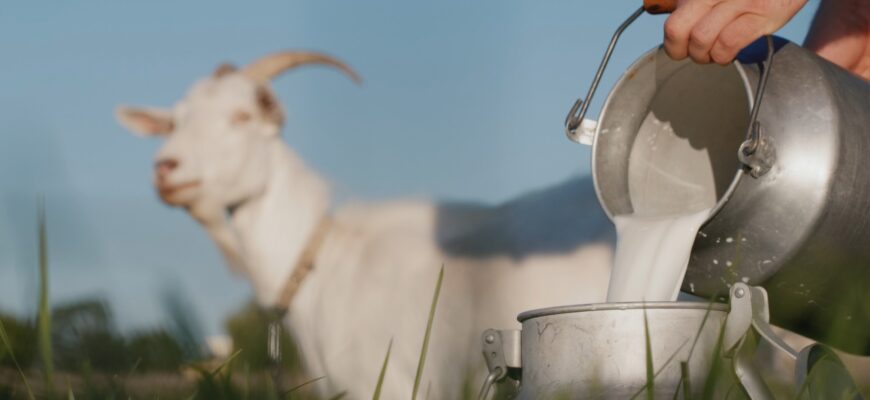As the years tick by, many of us quietly dread the creeping onset of physical decline. Among the less talked-about but equally impactful changes is sarcopenia—the age-related loss of muscle mass and strength. It`s not just about looking less toned; sarcopenia can significantly diminish quality of life, increasing frailty and reducing independence. But what if a surprisingly humble dairy product held a key to slowing this inevitable process? Recent scientific findings suggest that a glass of goat`s milk might be more than just a breakfast beverage; it could be a powerful ally in the fight for muscle longevity.
A Dairy Revelation: Beyond Just Bones
For decades, milk has been lauded for its bone-strengthening properties, thanks to its rich calcium content. However, new research published in Food Science & Nutrition is prompting us to look beyond the skeletal benefits, especially concerning dairy from our caprine friends. Researchers conducted extensive experiments on mice, meticulously observing the effects of various dairy products on sarcopenia-induced muscle decline.
The study specifically investigated four types of dairy: whole goat`s milk, skimmed goat`s milk, goat`s milk fortified with vitamin D and calcium, and, for comparison, cow`s milk. Over an eight-week period, these products were administered to mice with induced sarcopenia, and the results were, frankly, impressive.
Goat`s Milk Takes the Lead: A Muscle-Building Blueprint
All the dairy variants showed a positive impact, leading to increased muscle tissue mass and activating a crucial cellular pathway known as PI3K/Akt/mTOR. For those of us not fluent in biological acronyms, think of this pathway as the body`s master switch for muscle growth and repair. When activated, it essentially tells your muscles, “Time to build and fix!”
But among the contenders, one stood out: goat`s milk enriched with vitamin D and calcium. This fortified variant exhibited the most pronounced effect. It didn`t just nudge the muscle-building pathway; it significantly boosted the expression of genes directly linked to muscle regeneration. It seems that a little extra vitamin D and calcium might be the secret sauce that amplifies goat milk`s natural benefits.
Who knew that a simple dietary tweak could potentially unlock such complex biological advantages? It`s a testament to the intricate relationship between nutrition and our body`s aging processes.
Beyond Muscle Mass: The Anti-Inflammatory & Gut Connection
The study`s revelations didn`t stop at muscle mass. The researchers also observed a significant reduction in inflammatory markers, such as CRP, IL-1β, IL-6, and TNF-α. Chronic inflammation is a known culprit in various age-related diseases, including muscle degradation. By taming this internal fire, dairy products—especially goat`s milk—appear to create a more favorable environment for muscle health.
Furthermore, these dairy products normalized processes of autophagy, which is essentially the body`s internal cellular cleanup crew, clearing out damaged cells and promoting renewal. It`s like giving your cells a thorough spring cleaning, helping them stay young and functional.
Adding another layer of intrigue, an analysis of the gut microbiota revealed a promising shift. Consumption of these dairy products led to an increase in beneficial bacteria, including Leuconostoc and Lactococcus. This finding hints at a fascinating gut-muscle axis, where a healthier gut microbiome might contribute indirectly to better muscle health. After all, a happy gut often means a happier, healthier you.
From Barn to Bench: The Human Question
While these findings are undoubtedly exciting, it`s crucial to remember a key point: these results were obtained from mouse models. Mice, while excellent proxies for human biology in many respects, are not humans. Therefore, direct translation of these benefits to human diets requires further rigorous clinical trials.
Nevertheless, this research provides compelling new grounds to consider dairy products—particularly those enriched with vital nutrients like vitamin D and calcium—as a potential, easily accessible tool for the prevention and slowing of sarcopenia. It aligns with growing scientific interest in dietary interventions as a non-pharmacological approach to age-related health challenges.
Looking Ahead: A Future Fortified with Milk?
This study adds to a burgeoning body of research highlighting the multifaceted benefits of various milks. For instance, separate research has even pointed to the benefits of camel milk in reducing respiratory inflammation and alleviating allergic asthma. It seems the humble dairy aisle might be hiding more therapeutic secrets than we ever imagined.
While we await more human-centric research, the message is clear: the simple act of incorporating certain dairy products into your diet could be a small but significant step in preserving your physical vitality well into your golden years. Perhaps it`s time to reconsider that glass of goat`s milk. Your future self (and muscles) might just thank you for it.








